Pick up function (System ES12.0 or later)
The pick up function displays a list of items to be collected to the worker and assists in pick up work.The work is carried out as follows.
Receive order file
Select and receive the order file via FTP reception.

Start pick up work
Select the pick up job from the menu screen and select "Q1: Yes" when asked "Do you use an order file?"
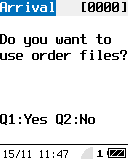
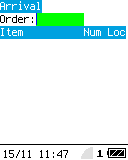
Read the order code
When you read the order code, a list of the items contained in the order code will be displayed.
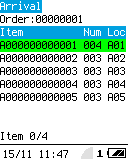
Read the item code on the order sheet
When you read the item code on the order sheet, you will be taken to the collection screen.
(If there is no order sheet, you can also select it with the ENT key.)
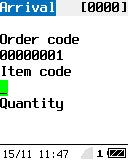
Read the actual item code
Read the actual barcode.
If it matches the barcode selected in the item list, you will move on to quantity input.
If the barcode does not match, an error will occur and you will not move on to quantity input.
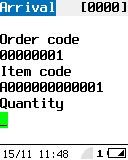
Enter quantity
Enter the quantity.
If it is less than the pick up number, you will return to entering the item code on the collection screen.
When the pick up number is reached, you will return to the item list.
When the pick up number is exceeded, a warning will be displayed when you press the ENT key.

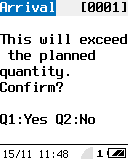
Repeat steps 5 and 6 until the total number of items reaches the pick up number
Items whose picked up number has reached the pick up number will be displayed in gray
Items whose picked up number matches the pick up number will be displayed in gray.
Items whose picked up number exceeds the pick up number will have an orange background.


Repeat steps 4 to 8 until all items in the list are completed.
Order Code: A number that contains multiple item code records, such as a purchase order number.
Item Code: A unique number for an item, such as an EAN code.
pick up number: The pick up number of items to be picked up.
Picked up number: The quantity of items picked up.
Order sheet: Detailed information such as order codes, item codes, and the name and location of the item is printed on the paper, and used for matching items and checking information.
If a barcode with a code type different from the actual barcode is printed on the orders, and the setting is set to read only barcodes of that code type, strict matching is possible.
(Example) Item code on orders = CODE39, actual item code = EAN code
Order sheet are not necessary if pick up work can be performed using only the information displayed on the handheld terminal.
Pick up Settings
(How to start)
Standard App Editor ⇨ Select the base function [Collection] task ⇨ Task screen ⇨ Pick up Settings...Operation example:
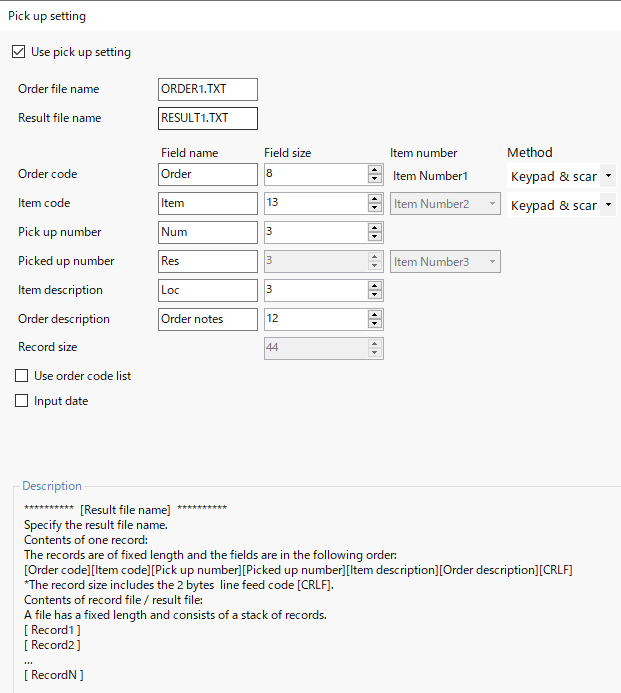
- Use pick up setting: Check to enable pick up settings.
- Order file name: Specify the order file name.
- Result file name: Specify the result file name.
- Order code: A number that manages records of multiple item codes.
- Item code: A number unique to the item.
- Pick up number: The quantity of items that are scheduled to be picked up.
- Picked up number: The quantity of items that have already been picked up.
- Item description: A description of the item. (The location where the item is installed, etc.)
- Order description: A description of the order code.
- Record size: The length of one record. Includes [CR][LF].
- Field name: Used as the title of the list.
- Field size: The number of bytes of the field in the record of the order file.
- Item number: The corresponding item number on the business screen.
- Method: Specify whether scanning and key input are possible.
Keypad only = Allows input using the keypad, and the item code or order code selected in the list is confirmed with the ENT key.
Scan only = Confirms when the item code or order code is scanned.
Keypad/scan = Allows input using the keypad, and confirms when the item code or order code is scanned and with the ENT key.
- Use order code list: Check to display a list of selectable order codes.
- Input date: Adds a date input field to the item list screen.
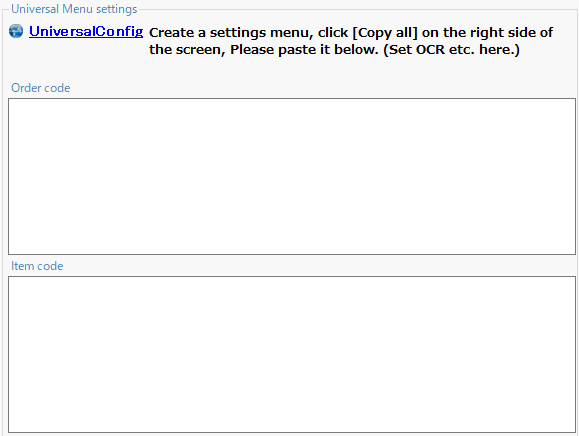
The Universal menu settings configure the scan module's reading settings. Copy the settings created in UniversalConfig and paste them into the text box.
- Order code: This is the reading setting when scanning an order code when entering/selecting from the pick up list.
- Item code: This is the read setting when scanning the item code in the pick up list selection.
Order file
Structure of order file
An order file is created by stacking fixed-length records. The length of one record is the record size.The result file has the same structure as the order file.
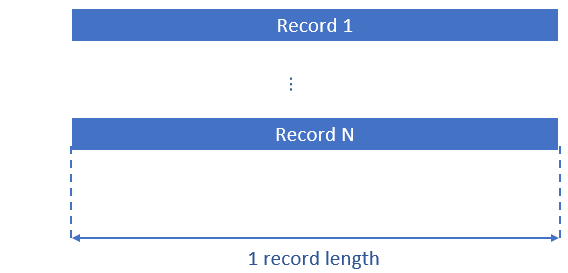
Structure of one record
One record has the following structure.It contains the order code, item code, and other data so that the total size is one record size.
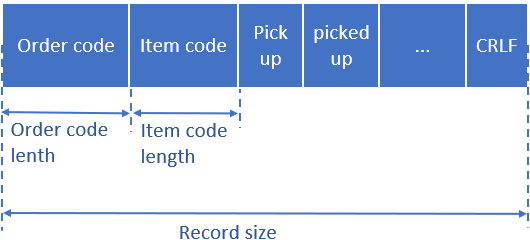
(Example of order file)
Setting value:
1 record size = 44 (8+13+3+3+3+12+2)
Order code length = 8
Item code length = 13
Pick up number length = 3
Picked up number length = 3
Item description length = 3
Order description length = 12
Line break [CR][LF] (2 bytes) = 2
Master file name: MASTER.TXT
Contents:
Z0000001A000000000001003000A01Z00000000001[CR][LF]
Z0000001A000000000002005000A02Z00000000001[CR][LF]